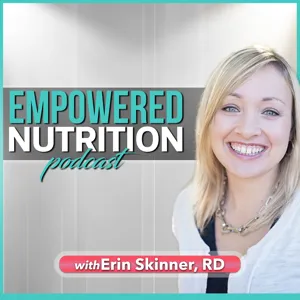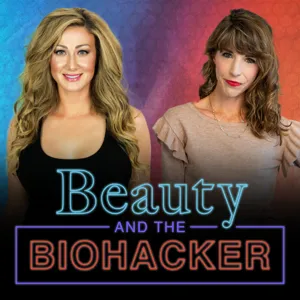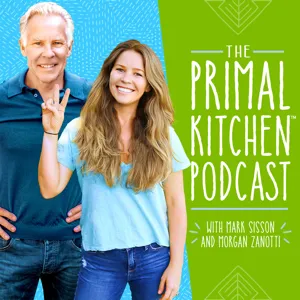Podcast Summary
Enhancing life's moments with Quincy and 1800 Flowers: Quincy offers travel essentials, 1800 Flowers delivers joy through celebratory gifts, both prioritize affordability and quality, and proper gut health is crucial for overall well-being.
Both Quincy and 1800 Flowers offer high-quality products at affordable prices, with Quincy focusing on travel essentials and 1800 Flowers on celebrating special occasions. When it comes to gut health, as discussed with expert Dr. Megan Rossi, it's essential to remember that gut health encompasses the entire digestive tract and its functioning, including nutrient absorption. Our microbiota, the beneficial bacteria in our gut, comes from various sources, including our mother's vaginal and fecal microbiota at birth, breast milk, food, and the environment. Proper gut health is crucial for overall health and well-being. Quincy's affordable yet high-quality travel essentials and 1800 Flowers' love-infused gifts allow us to enhance different aspects of our lives while delivering value and joy.
The Role of Gut Microbiota in Our Health: The gut microbiota, comprised of trillions of microorganisms, significantly impacts our health through a synergistic relationship with human cells. Diet influences its composition, and most bacteria are beneficial, not good or bad, in the context of their environment.
Our gut microbiota, which is made up of trillions of microorganisms including bacteria, viruses, and fungi, plays a crucial role in our health. This diverse ecosystem is established early in life and becomes quite stable by the age of 3. Diet is a major influencer of the gut microbiota, and the microbes we host have a synergistic relationship with human cells. Over 95% of the bacteria in our bodies are beneficial, and it's not about labeling them as good or bad, but rather understanding the environment they're in. The concept of beneficial bacteria is a relatively new discovery, as it was once believed that all bacteria were detrimental. However, scientists like Elie Metchnikoff challenged this thinking in the late 19th and early 20th centuries, leading to the probiotic concept and the realization that we can work with these microbes to improve our health. The study of the microbiota has been ongoing since the discovery of bacteria in the 1700s, but it wasn't until the late 1800s and early 1900s that the potential benefits of these microbes began to be explored.
Appreciation for beneficial gut microbes: The gut microbiota contains beneficial microbes that produce hormones, vitamins, and metabolites, and their functionality is much more extensive than previously thought.
Our understanding of the role of gut microbes in our health has evolved significantly over the centuries. While early practices like pasteurization and the development of vaccines focused on eliminating bacteria, the last decade has seen a shift in appreciation for the beneficial functions of these microbes. The gut microbiota, which is the largest concentration of microbes in our bodies, contains genes with a 150-fold greater functionality than human genes. These microbes produce beneficial hormones and vitamins, digest dietary fiber, and create metabolites like short-chain fatty acids. These metabolites are metabolically active and can even communicate with the brain. Our perception of fiber has also changed, as research now shows that it has much broader functions beyond just aiding digestion, including vitamin production and immunity support. The importance of these microbes in our health is becoming increasingly clear, and their functionality is much more extensive than previously thought.
Gut health and immune system connection: Focusing on increasing gut microbiota diversity through diet and potential treatments could improve overall health and well-being. Chronic diseases like IBD, asthma, and obesity linked to lower microbiota diversity.
Our gastrointestinal tract is home to the majority of our immune system, and the health of our gut microbiota, which is largely influenced by the foods we consume, particularly fiber, has widespread effects on various systems in our body, including our brain, heart, and cardiovascular health. The diversity of microbes in our gut plays a crucial role in our resilience against illnesses and pathogens. Studies have shown that individuals with chronic diseases, such as inflammatory bowel disease, asthma, and obesity, have a lower diversity of microbes compared to a healthy population. This suggests that focusing on increasing the diversity of our gut microbiota through diet and potentially microbiota-focused treatments could be a promising approach for improving overall health and well-being. However, more research is needed to fully understand the function of different bacteria and the specific proteins and genes they switch on and off, before we can develop effective microbiome-focused treatments. The discovery of the gut microbiota is a recent development in understanding how diet impacts our health, as we are only beginning to scratch the surface of this complex and fascinating area of research.
Microbiome and Probiotics: Limited Impact on Mental and Heart Health: Personalized nutrition based on gut bacteria function, like low FODMAP diet and fiber intake, shows promise for improving mental and heart health.
While the microbiome and probiotics have gained popularity in recent years, it's important to remember that one probiotic capsule contains a vast number of bacteria, making it unlikely for a single strain to significantly impact mental or heart health. Currently, testing the microbiome outside of research doesn't provide much actionable information for clinical practice. However, personalized nutrition based on gut bacteria function, such as predicting response to dietary interventions, shows promise. A low FODMAP diet, which restricts short-chain fermentable carbohydrates, is an example of personalized nutrition. Fiber, derived from plant-based foods, is essential as it feeds different types of microbes and comes in various forms. Diversity in fiber sources is crucial.
Understanding Fiber's Complex Role: Aim for fiber variety, focus on fermentable types, and consider probiotics for specific conditions, but maintain objective measures for their effectiveness.
The classification of fiber into soluble and insoluble categories is oversimplified. Instead, it's essential to consider the fermentability of fiber, whether it's rapidly fermented by bacteria or just provides stool bulk. A varied diet rich in fiber from various sources is key, as many high fiber foods contain antioxidants, particularly polyphenols, which require bacterial fermentation for humans to absorb and benefit from. While probiotics and fiber supplements are popular, the evidence for their benefits for the general population is not conclusive. For those considering taking probiotics, maintaining an objective measure of symptoms before and after use can help determine if they're worth the investment. Probiotics may have benefits for specific conditions like traveler's diarrhea and IBS.
Exploring innovative methods in microbiome research: Researchers are investigating new ways to harness the power of the gut microbiome, such as storing and reintroducing a person's own microbiota before treatments, while maintaining a healthy gut microbiome through diet, probiotics, and regular check-ins can support overall health.
The future of microbiota and microbiome research holds great promise, particularly in the area of fecal microbial transplants. However, it's important to note that this procedure is not yet safe or widely recommended due to potential risks, such as transferring unwanted bacteria or conditions like anxiety or depression. Instead, researchers are exploring innovative methods like storing and reintroducing a person's own gut microbiota before treatments, such as chemotherapy. While the potential benefits of these approaches are exciting, there are still many unknowns, and further research is needed to fully understand the complex relationship between the gut microbiome and various health conditions. In the meantime, maintaining a healthy gut microbiome through diet, probiotics, and regular check-ins with healthcare professionals can help support overall health and wellbeing.
Nurturing your microbiome for better health: Eat whole grains, legumes, colorful veggies for fiber, prepare foods from scratch, aim for diet variety, avoid antibiotics, manage stress, consume less processed fiber, and try fermented foods.
Nurturing your microbiome for better health involves daily habits based on current research. Fiber intake is crucial, with whole grains, legumes, and colorful vegetables providing essential nutrients and fiber types for your microbes. Preparing these foods from scratch is ideal, but convenient options are also effective. Variety in your diet is important, as different phytochemicals found in various fruits and vegetables benefit your microbiome. Avoiding unnecessary antibiotics and addressing lifestyle factors like poor sleep and stress through restorative measures can also support a healthy microbiome. Additionally, less processed fiber sources, such as whole grains and big oats, are recommended, and fermented foods like kombucha and kefir may provide benefits due to their long history of use and association with health. Remember to subscribe to the Doctor's Kitchen podcast and follow Megan Rossi on social media for more information.
Unique experiences and high-quality products from Doctorskitchen.com, 1800flowers.com, and Quince: Doctorskitchen.com offers fiber-rich recipes and personalized interaction, 1800flowers.com delivers love and smiles, and Quince enables ethical and stylish travel.
Doctorskitchen.com and 1800flowers.com offer unique experiences and high-quality products. Doctorskitchen.com, led by a doctor, provides fiber-rich recipes, information, and events, inviting a personal touch. Meanwhile, 1800flowers.com goes beyond gifting for special occasions by putting heart and love into every product and service they offer. On the other hand, Quinn's is a go-to destination for jet-setting essentials, offering high-quality European linen, luggage, and Italian leather bags at affordable prices. Quince ensures ethical manufacturing practices, making it a responsible choice for travelers. In summary, whether it's cooking, gifting, or traveling, these brands provide meaningful connections and exceptional experiences. Doctorskitchen.com offers fiber-rich recipes and personalized interaction, 1800flowers.com delivers love and smiles, and Quince enables ethical and stylish travel.





